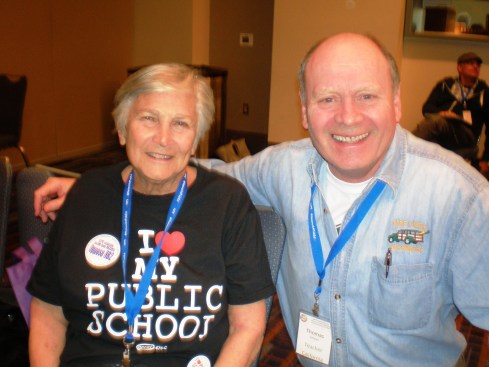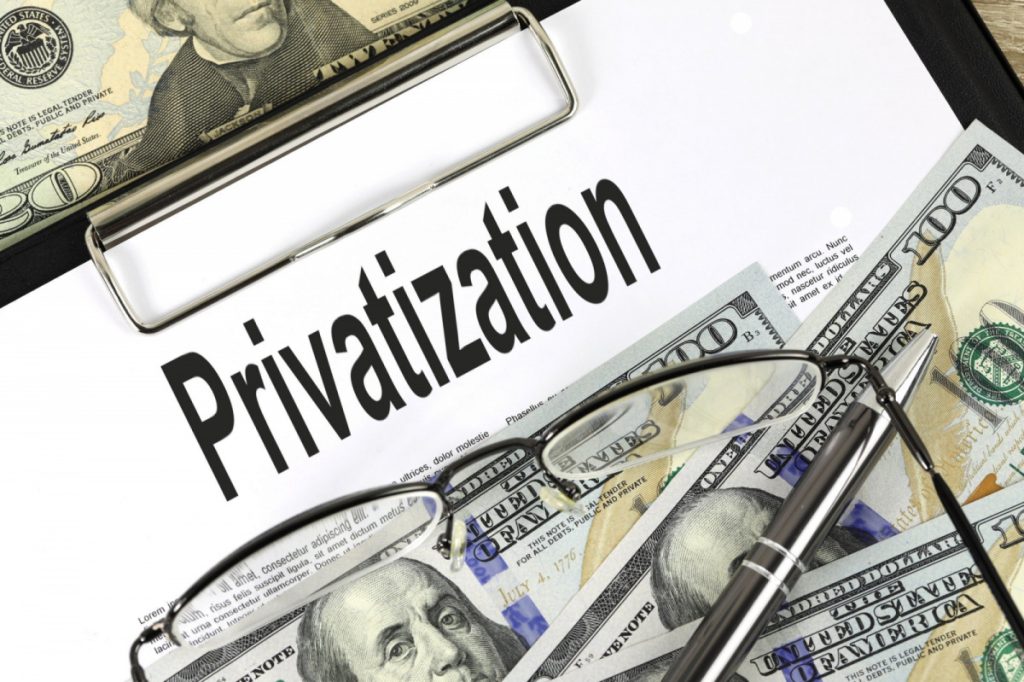Blogger Meg White posted on her WordPress blog (@reflectionsined) about Senator Bernie Sanders’ opposition to vouchers, which are overwhelmingly used by students who are already enrolled in private schools and are free to discriminate. The Trump administration has passed voucher legislation and is encouraging the spread of vouchers. In theory, vouchers enable poor students to transfer to better schools. In practice and in reality, vouchers are a subsidy for the rich.
Meg is an advocate for public schools and co-author of a valuable book about desegregation in New Orleans and how it affected one school: William Frantz Public School: A Story of Race, Resistance, Resiliency, and Recovery in New Orleans.
Last week, Senator Bernie Sanders (D-VT) released a report that addresses the federal school voucher program. In the report, Sanders charges that “The Trump administration’s school privatization agenda threatens our nation’s public schools and harms working-class students, students with disabilities, and students from diverse religious backgrounds” (forbes.com). Sanders is a ranking member of the Health, Education, Labor, and Pensions Committee (HELP).

Sanders said, “President Trump and his billionaire campaign contributors have been working overtime to create a two-tier education system in America: private schools for the wealthy and well-connected and severely under-funded public schools for low-income and working-class students. That is unacceptable. This report makes clear that vouchers are being used to benefit private schools that reject students because they have a disability or because of their religion, and benefit some of the wealthiest families in America. Trump’s voucher program will only make a bad situation even worse (sanders.senate.gov).
The report analyzed state-level school voucher programs, including 111 SGOs and 1,600 voucher-accepting private schools across eleven states.
The report finds that school voucher programs:
- Subsidize private education for the rich. School vouchers, on average, cover just 39% of middle school private school tuition across the sampled states. Even with a private school voucher, tuition prices are often out of reach for working-class families, meaning that the vouchers function as a subsidy to the rich who can already afford to pay for private education.
- Allow private schools to systematically deny admission to students with disabilities, limit how many students with disabilities they serve, only serve children with certain types of disabilities or charge extra tuition. While public schools must provide all students with the same opportunities to learn and excel, 48% of private schools analyzed in this report choose not to provide all students with disabilities with the services, protections and rights provided to those students in public schools under the IDEA.
- Enable private schools to discriminate against students based on their religion. This report finds that despite the fundamental right of freedom of religion enshrined in our constitution, voucher programs benefit private schools that discriminate against students based on their religious beliefs. Specifically, 17% of private schools reviewed in this report charge different tuition rates based on the family’s religious beliefs.
- Benefit private schools that lack basic credentialing, accountability and transparency requirements. Fewer than half of states reviewed require private schools to be accredited, while even fewer require student learning assessments. Unacceptably, only two states require teacher credentials in private schools receiving vouchers (sanders.senate.gov).
“Bottom line, in my view, we should be strengthening and expanding public education, the foundation of American democracy, where Black and White and Latino, rich and poor kids come together in one room” rather than privatizing public education, Sanders said (k-12.com).
The report comes ahead of a HELP Committee hearing where Arizona Education Association President Marisol Garcia will testify about the harms of private school vouchers in her state, which has the nation’s largest universal school voucher program and is a cautionary tale for the rest of the nation. The state is now spending nearly $1 billion annually on private school vouchers, while public schools are being forced to shut down (sanders.senate.gov).Researchers found that the use of vouchers in Arizona is highest in affluent school districts, and lowest in poorer school districts. More than half of voucher students came from the wealthiest quarter of zip codes in the state, with median incomes ranging from $81,000 to $178,000. Most of those students have never attended public schools (azmirror.com).
After Florida cleared the way in 2023 for any family in the state to get a taxpayer-funded school voucher regardless of income, students signed up in droves. Enrollment in the voucher program has almost doubled to half a million children. But by the end of the 2024-25 school year, the program cost $398 million more than expected. When students switched between public schools and voucher-funded programs, tax dollars did not move with them as lawmakers had promised. “On any given day, Florida’s education department did not know where 30,000 students were going to school and could not account for the $270 million in taxpayer funds it took to support them, according to the state Senate Appropriations Committee on Pre-K-12 Education” (msn.com). in 2023, of the 122,895 new students who signed up for vouchers, 69% (84,505) were already in private school, 13% (16,096) came from public schools, and the remainder were new kindergarteners (ncpecoalition.org).
According to the Arkansas Department of Education, 95% of the participants in the state’s universal voucher program had never attended public schools before receiving a voucher (ncpecoalition.org).
Most students in Indiana’s voucher program come from well-off families. During the 2022-2023 school year, voucher recipients were more likely to come from families that made more than $100,000 per year than families that made less than $50,000 per year (the74million.org).
Since Ohio expanded its voucher program to wealthy families, the percentage of low-income students using vouchers in Cleveland fell from 35% to 7%. Now, most Ohio voucher students did not attend public schools before they took a voucher: the percentage of voucher students statewide who had already attended a private school in the year prior jumped from 7% in 2019 to almost 55% in 2023 (ncpecoalition.org).
State-provided data shows that about two-thirds of students receiving vouchers in Iowa’s new statewide program were already attending private schools before getting taxpayer money for tuition. Only about 13% of voucher recipients had ever previously attended a public school (ncpecoalition.org).
Savannah Newhouse, Department of Education Press Secretary commented, “Opponents of President Trump’s Education Freedom Tax Credit are quick to lecture about equity and fairness, but they’re fighting to keep families trapped in failing government-run schools and environments that don’t meet kids’ needs. The reality is this historic tax credit, funded entirely from private philanthropic dollars, puts parents in the driver’s seat—supporting scholarships that can be used for tutoring at public schools, tuition, and essential services for students with disabilities. Expanding school choice levels the playing field so that every family, no matter their income or needs, can better prepare their child for success”. (forbes.com).
Sure, because it’s working so well.

Public Schools in the U.S. educate 90% of the children. Strengthening and supporting public education is essential to maintaining a fair and equitable society. As Sanders’ report illustrates, universal voucher programs serve as a taxpayer-funded subsidy for the wealthy, leaving working-class families behind. Diverting billions of dollars to unregulated private schools not only creates massive budget shortfalls but also destabilizes neighborhood schools that serve the vast majority of American children.
These are my reflections for today.
If you like what you’re reading, consider sharing and following my blog via email.


